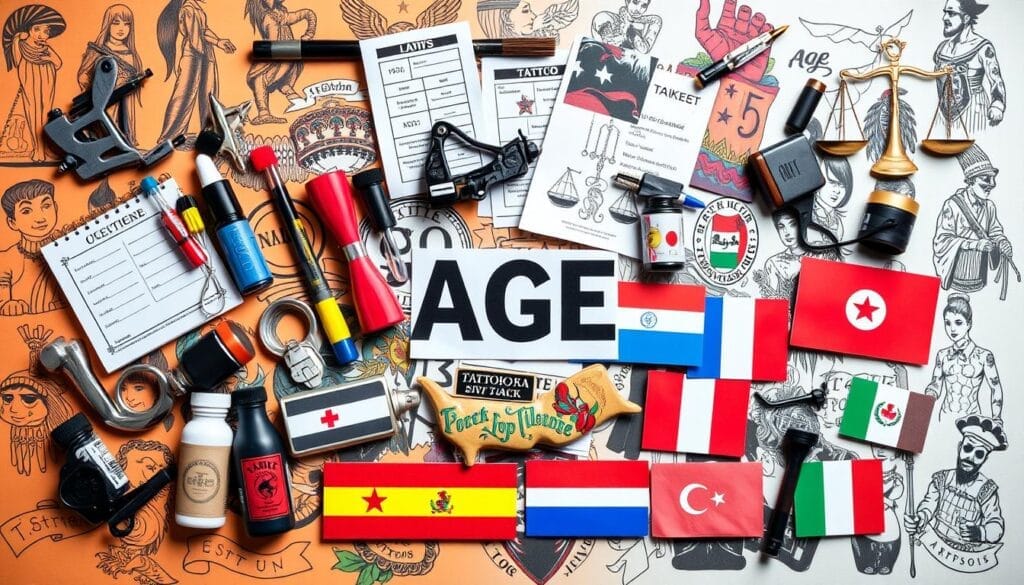Uncategorized
Legal Age for Tattoos: Everything You Need to Know
Table of Contents
Navigating the complex landscape of tattoo age laws can be a daunting task, but it’s essential for individuals considering body art to understand the legal requirements. This article delves into the legal tattoo age across different states, exploring the variations in state and local regulations, as well as the parental consent and verification processes. By understanding the tattoo age requirements, individuals can make informed decisions and ensure they comply with the law.
Key Takeaways
- The legal tattoo age varies across different states, with most requiring individuals to be at least 18 years old.
- Parental consent is often necessary for minors to obtain a tattoo, and the verification process can vary.
- Violating underage tattooing laws can result in significant penalties for both the individual and the tattoo artist.
- Responsible decision-making and awareness of tattoo age requirements are crucial for individuals considering body art.
- Future trends in tattoo age laws may continue to evolve, reflecting changing societal attitudes and concerns.
Introduction to Tattoo Age Laws
As the popularity of body art regulations continues to grow, it is crucial to understand the legal requirements surrounding tattoos, particularly the age restrictions. Across the United States, there are various state and local laws that govern the minimum age for getting a tattoo, as well as the processes for obtaining parental permission for tattoos and minor tattoo consent.
While the legal age for tattoos is typically 18 years old, there are some exceptions and variations in regulations that individuals should be aware of. In this section, we will provide a comprehensive overview of the legal landscape surrounding tattoo age laws, exploring the nuances and considerations that come into play when getting inked.
- Understand the general minimum legal age for tattoos in the United States.
- Explore the variations in state and local regulations regarding tattoo age requirements.
- Learn about the processes and requirements for obtaining parental consent for minors to get tattoos.
- Discover the potential exceptions and exemptions to tattoo age laws.
By delving into the complexities of tattoo age laws, individuals can make informed decisions and ensure they comply with the relevant regulations when pursuing their body art aspirations. This knowledge will empower them to navigate the legal landscape and make responsible choices when it comes to their personal expression through tattoos.

Understanding the Minimum Legal Age for Tattooing
When it comes to the legal age for getting a tattoo, the rules can vary significantly across different states and even within local jurisdictions. It’s crucial for individuals interested in getting body art to understand the specific requirements in their area.
Variations in State and Local Regulations
The minimum legal age for tattoos is not uniform throughout the United States. While some states set the age limit at 18 years old, others may allow individuals as young as 16 to get inked, provided they have parental consent. Additionally, certain cities and counties may have their own regulations that differ from the state-level laws.
For example, in California, the legal age for tattoos is 18 without parental approval. However, in Massachusetts, individuals as young as 16 can get a tattoo with the written consent of a parent or guardian. Conversely, New York state mandates that all tattoo recipients must be at least 18 years old, regardless of parental involvement.
| State | Minimum Legal Age for Tattoos |
|---|---|
| California | 18 (without parental consent) |
| Massachusetts | 16 (with parental consent) |
| New York | 18 (regardless of parental consent) |
These variations highlight the importance of researching the tattoo laws in your specific location before seeking body art. Failure to comply with the how old do you have to be to get a tattoo requirements can result in significant penalties for both the tattoo recipient and the artist.

Parental Consent Requirements for Minors
When it comes to obtaining tattoos, the legal landscape can be complex, especially for minors. Across the United States, parental consent is typically required for individuals under the legal age to receive permanent body art. This process ensures that guardians are informed and approve of their child’s decision to get a tattoo.
Proving Parental Authorization
To comply with the law, tattoo studios often have specific protocols in place to verify parental permission. This may involve providing a valid government-issued ID, such as a driver’s license or passport, for the parent or legal guardian. Additionally, some studios may require the parent to be present during the tattooing session or to provide a signed consent form.
- Valid government-issued ID for parent or guardian
- Signed parental consent form
- Presence of parent or guardian during the tattooing process
The documentation and verification requirements can vary depending on the individual tattoo studio’s policies and the specific state or local regulations. It is crucial for minors and their families to thoroughly research the legal requirements and ensure they have the necessary permissions in place before pursuing a tattoo.

| State | Minimum Age for Tattoos with Parental Consent | Parental Consent Requirements |
|---|---|---|
| California | 16 years old | Written parental consent, parent must be present |
| New York | 16 years old | Notarized parental consent form |
| Texas | 18 years old | Written parental consent |
By understanding the specific parental permission for tattoos and minor tattoo consent requirements in their area, minors and their families can make informed decisions and ensure a safe, legal tattoo experience.
how old do you have to be to get a tattoo
When it comes to getting a tattoo, the legal age requirement is a crucial consideration. In most states across the United States, the minimum age to receive a tattoo is 18 years old. This age limit is in place to protect underage individuals from potential health risks and ensure they make an informed decision about permanently altering their body.
The rationale behind the 18-year-old age requirement is twofold. First, it recognizes that individuals below the age of 18 may not have the maturity or foresight to fully comprehend the long-term implications of a tattoo. Tattoos are a lifelong commitment, and younger people may not be equipped to make such a significant decision. Secondly, there are potential health concerns associated with underage tattooing, as the body is still developing and may be more susceptible to infections or complications.
However, it’s important to note that some states and local jurisdictions may have slightly different age requirements for getting a tattoo. For example, a few states allow minors to obtain a tattoo with parental consent or supervision. It’s always best to research the specific laws and regulations in your area before considering a tattoo.
Ultimately, the legal age for tattoos is in place to protect individuals and ensure they make an informed decision about their body art. By adhering to these laws, both tattoo artists and customers can help maintain a safe and responsible tattoo industry.
Exceptions and Exemptions to Tattoo Age Laws
While the general rule is that individuals must be at least 18 years old to get a tattoo, there may be some rare exceptions or exemptions to this tattoo age requirements. These unique cases allow minors to legally receive body art, often with specific conditions or approvals in place.
Parental Consent
In some states, minors may be permitted to get a tattoo with the written consent of a parent or legal guardian. The parent must typically accompany the minor to the tattoo studio and provide proper identification. This exemption is intended to give families the flexibility to make informed decisions about underage tattooing.
Medical or Religious Reasons
Rare exceptions may also be made for medical or religious purposes. For instance, a minor could receive a tattoo as part of a cultural or spiritual practice, or to cover up scarring from a medical procedure. These situations are evaluated on a case-by-case basis and require documentation or verification.
| State | Minimum Age | Parental Consent Required |
|---|---|---|
| California | 18 | Yes |
| Texas | 18 | Yes |
| New York | 18 | No |
It’s important to note that these exceptions are uncommon and have strict guidelines. Tattoo artists and studios must carefully verify a minor’s eligibility before proceeding with any body art procedure. Ultimately, the safety and well-being of the individual remains the top priority.

Penalties for Violating Underage Tattooing Laws
Engaging in or facilitating underage tattooing can result in serious consequences for both the individual receiving the tattoo and the tattoo artist performing the procedure. Across the United States, laws and regulations are in place to protect minors from the potential health risks and legal implications of undergoing body art before the legal age.
Consequences for Tattoo Artists
Tattoo artists who violate underage tattooing laws can face a range of penalties, including significant fines and even criminal charges. Depending on the jurisdiction, tattoo artists may be subject to the following consequences for providing tattoos to minors:
- Monetary Fines: Tattoo artists can be required to pay hefty fines, often ranging from hundreds to thousands of dollars, for each instance of providing tattoos to underage clients.
- License Revocation: Repeated violations or egregious cases may result in the revocation of a tattoo artist’s license, effectively preventing them from legally practicing their profession.
- Criminal Charges: In some states, tattooing a minor without proper parental consent can be considered a criminal offense, leading to potential jail time or other legal repercussions for the tattoo artist.
The severity of the consequences often depends on the specific laws and regulations in the tattoo artist’s state or local jurisdiction, as well as the details of the individual case.

Ultimately, tattoo artists have a professional and ethical responsibility to ensure they are complying with all applicable tattoo laws and verifying the age and consent of their clients before providing any body art services. Failure to do so can result in significant penalties that can jeopardize their livelihood and reputation.
Religious and Cultural Considerations
When it comes to body art regulations, it’s important to recognize the profound cultural and religious significance that tattoos can hold for some individuals. Tattoos have been used for centuries as a means of self-expression, identity, and spiritual connection across a wide range of belief systems and traditions.
For many cultures, tattoos are not merely a form of personal adornment but rather a sacred ritual with deep-rooted symbolism. In some indigenous communities, tattoos may signify rites of passage, familial lineage, or connection to the natural world. Similarly, certain religious denominations view tattoos as a way to outwardly display one’s faith or personal devotion.
These cultural and religious factors can significantly influence the legal and ethical considerations surrounding tattoos, particularly when minors are involved. Lawmakers and regulatory bodies must carefully balance individual freedoms with the need to protect vulnerable populations, all while respecting the diversity of beliefs and practices that exist within a society.
As the field of body art regulations continues to evolve, it’s essential that policymakers engage in thoughtful dialogue with various cultural and religious communities to ensure that their needs and perspectives are taken into account. Only by fostering a nuanced understanding of these complex issues can we develop a regulatory framework that is both fair and inclusive.
“Tattoos are a sacred art form, a way to carry our stories and our beliefs on our bodies. They are not simply cosmetic, but a reflection of our deepest selves.”

Tattoo Studio Policies and Regulations
When it comes to the world of tattoos, tattoo studios are subject to their own set of policies and regulations to ensure compliance with the law. One of the primary concerns for these studios is verifying the age of their clients, particularly when it comes to underage tattooing.
Age Verification Procedures
Tattoo artists and studios have implemented various age verification procedures to prevent underage individuals from receiving tattoos. These measures typically include:
- Requiring a valid government-issued photo ID, such as a driver’s license or passport, to confirm the client’s age.
- Maintaining a detailed record of each client’s name, age, and the tattoo design they requested.
- Refusing service to anyone who cannot provide proper identification or who appears to be underage.
- Educating their staff on the importance of adhering to tattoo studio policies and the legal requirements surrounding underage tattooing.
Some studios may even go a step further by implementing additional safeguards, such as requiring parental consent for minors or limiting the types of tattoos that can be done on younger individuals.
| Tattoo Studio Policy | Description |
|---|---|
| Age Verification | Requiring a valid government-issued photo ID to confirm the client’s age. |
| Client Record Keeping | Maintaining detailed records of each client’s name, age, and tattoo design. |
| Refusal of Service | Denying service to anyone who cannot provide proper identification or appears to be underage. |
| Staff Education | Educating employees on the importance of adhering to tattoo studio policies and legal requirements. |
| Parental Consent | Requiring parental consent for minors to receive a tattoo. |
| Tattoo Restrictions | Limiting the types of tattoos that can be done on younger individuals. |
By implementing these tattoo studio policies and age verification procedures, tattoo artists and studios strive to maintain a safe and responsible environment for their clients, while also ensuring compliance with the law.
Health Risks of Underage Tattooing
Obtaining a tattoo at a young age can expose individuals to significant health risks. Underage tattooing, a practice that often disregards legal age requirements, can lead to a host of complications that can have lasting impacts on one’s well-being.
One of the primary concerns with underage tattooing is the increased risk of infection. Tattoo needles, if not properly sterilized, can introduce harmful bacteria and viruses into the skin, leading to potentially serious infections such as hepatitis, HIV, and bacterial skin infections. These infections can not only cause immediate health issues but also have long-term consequences if left untreated.
Another risk associated with underage tattooing is the potential for scarring and other skin damage. The skin of younger individuals is often more delicate and prone to scarring, and inexperienced tattoo artists may inadvertently cause permanent damage to the skin during the tattooing process. This can result in unsightly and potentially disfiguring scars that can be difficult to treat.
Furthermore, the use of unsafe or untested inks and pigments in the tattooing process can lead to allergic reactions, skin irritation, and even the development of toxic substances in the body. These complications can cause significant discomfort and may require medical intervention to address.
Ultimately, the health risks associated with underage tattooing underscores the importance of waiting until the legal age to obtain a tattoo. By adhering to age restrictions and ensuring that the tattooing process is performed by a licensed and reputable artist, individuals can minimize the potential for harmful consequences and safeguard their long-term health and well-being.
| Health Risk | Description |
|---|---|
| Infection | Exposure to harmful bacteria and viruses due to poor sanitation or sterilization, leading to serious infections such as hepatitis, HIV, and bacterial skin infections. |
| Scarring and Skin Damage | Delicate skin of younger individuals is prone to scarring and permanent skin damage due to inexperienced tattooing techniques. |
| Allergic Reactions | Potential for allergic reactions and skin irritation from the use of unsafe or untested inks and pigments. |
The health risks associated with underage tattooing are significant and should not be overlooked. By understanding these potential dangers and adhering to legal age requirements, individuals can make informed decisions and prioritize their long-term health and well-being.
Body Art Regulations Beyond Age Restrictions
While the legal age for tattoos is a crucial consideration, there are additional body art regulations that individuals should be aware of. Beyond age limits, body art practices are subject to a range of other restrictions and requirements that aim to ensure public health and safety.
One key aspect of body art regulations involves restrictions on certain types of body modifications. For example, some jurisdictions prohibit or regulate procedures like genital piercing, scarification, and branding due to the increased health risks associated with these practices. Tattoo artists and studios must be informed about these specialized regulations to operate within the law.
Additionally, body art regulations often mandate the use of specific materials and sterilization methods. Tattoo inks, needles, and other equipment must meet strict safety standards to minimize the spread of infections and other complications. Proper sanitization and waste disposal protocols are also closely monitored by regulatory authorities.
| Regulation Type | Key Requirements |
|---|---|
| Restricted Body Modifications |
|
| Material Safety Standards |
|
By understanding the full scope of body art regulations, individuals can make informed decisions about their body modification choices and ensure they engage with reputable, compliant studios and practitioners.
Responsible Tattoo Decisions for Minors
For those not yet of legal age, making responsible and informed decisions about tattoos is crucial. While the allure of body art may be strong, it’s important to consider the long-term implications before taking the plunge. Parents and minors alike must navigate this process carefully, ensuring they understand the legal requirements and potential risks involved.
Understanding the Consent Process
In most states, minors require parental permission for tattoos. This means that before any work can be done, the tattoo artist must obtain written consent from a parent or legal guardian. The consent form typically outlines the tattoo design, placement, and any potential health concerns. It’s essential that both the minor and parent thoroughly review and understand this document.
Considering the Long-Term Impact
Tattoos are a lifelong commitment, and it’s crucial for minors to understand the implications of their choices. While the design may seem appealing in the moment, it could become a source of regret or embarrassment in the future. Minors should be encouraged to carefully consider the message they want to convey and the potential impact on their personal and professional lives.
As one tattoo artist advises, “A tattoo is not just a piece of art, it’s a reflection of who you are. Minors need to make sure they’re making a decision they can live with, not just for today, but for the rest of their lives.”
Seeking Professional Guidance
Before committing to a tattoo, minors should consult with experienced tattoo artists and professionals who can provide guidance on the process, potential risks, and long-term considerations. These experts can help ensure that the minor tattoo consent process is handled responsibly and that the final design is a thoughtful reflection of the individual’s values and aspirations.
By approaching the tattoo decision with care and wisdom, minors can make choices that they can be proud of for years to come.
“A tattoo is a lifelong commitment, and minors need to understand the full weight of that decision. It’s not just about the design, but the impact it can have on their lives.”
| Factors to Consider | Potential Consequences |
|---|---|
| Regret over the design or placement | Difficulty covering up or removing the tattoo in the future |
| Negative impact on future employment or personal relationships | Difficulty obtaining certain jobs or educational opportunities |
| Health risks associated with improper tattooing procedures | Infections, allergic reactions, or other medical complications |
Future Trends in Tattoo Age Laws
As the popularity of tattoos continues to grow, the laws and regulations surrounding them may evolve over time. While the current minimum age requirements for obtaining a tattoo vary across different states and localities, there are several potential future trends that could shape the landscape of tattoo age requirements and tattoo laws.
One potential development is the possibility of a more standardized approach to tattoo age laws across the United States. Currently, the minimum age for getting a tattoo can range from 16 to 18 years old, with some states allowing parental consent for minors. In the future, there may be a push for a nationwide consensus on the appropriate age limit, potentially lowering or raising the minimum age requirement.
Another trend to consider is the increasing use of technology in the tattoo industry. Advancements in digital record-keeping and biometric identification could lead to more stringent age verification processes at tattoo studios. This could include the implementation of systems that accurately validate a person’s age before allowing them to receive a tattoo.
| Potential Future Trends | Possible Implications |
|---|---|
| Standardized Minimum Age Requirements | A nationwide consensus on the appropriate age limit for obtaining a tattoo, potentially lowering or raising the current standards. |
| Increased Use of Technology in Age Verification | Advancements in digital record-keeping and biometric identification could lead to more robust age validation processes at tattoo studios. |
| Expanded Parental Consent Regulations | Stricter requirements or additional documentation for minors seeking parental approval to get a tattoo. |
Additionally, there may be a shift towards more comprehensive tattoo age laws that go beyond just the minimum age requirement. This could include expanded parental consent regulations, with stricter requirements or additional documentation needed for minors to obtain a tattoo with parental approval.
As the landscape of body art continues to evolve, it is essential for individuals, tattoo artists, and policymakers to stay informed about the potential changes in tattoo age requirements and tattoo laws to ensure compliance and responsible decision-making.
Conclusion
In conclusion, the legal age for getting a tattoo is an essential consideration for individuals of all ages. This article has provided a comprehensive overview of the relevant laws and regulations, as well as the potential risks and considerations involved in obtaining a tattoo. By understanding the requirements and making informed decisions, individuals can ensure they comply with the law and prioritize their health and safety.
Whether you’re interested in getting your first tattoo or considering additional body art, it’s crucial to familiarize yourself with the how old do you have to be to get a tattoo and the tattoo age requirements in your local area. Adhering to these guidelines not only protects your wellbeing but also upholds the integrity of the tattoo industry and the artists who dedicate their craft to providing a safe and satisfying experience for their clients.
As tattoos continue to gain mainstream acceptance, it’s essential to remain vigilant and make responsible choices. By staying informed and respecting the legal framework surrounding how old do you have to be to get a tattoo, individuals can enjoy the art of body modification while prioritizing their safety and wellbeing.

